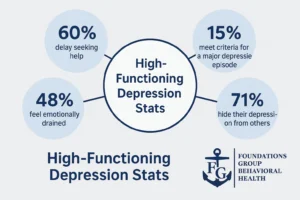Some people fall apart loudly.
Others do it quietly, behind locked doors, beneath perfect calendars and full inboxes.
You’re the second kind.
You still show up. Still answer emails. Still post the occasional photo. But something’s changed. You feel like a ghost in your own life—functioning, but flat. You keep coping, because that’s what you’ve always done. But if you’re honest, it’s getting harder to hold it all together.
This blog is for that version of you—the one that looks fine but feels like they’re running on fumes. You don’t have to crash to deserve support. In fact, if you’re reading this before things fall apart, that’s a strength—not a failure.
At Foundations Group Behavioral Health, we specialize in helping high-functioning people navigate depression with care, confidentiality, and clarity. Our depression treatment program in Cape Cod, MA, is built for people like you—the ones who are silently struggling while still “doing everything right.”
The Hidden Weight of High-Functioning Depression
High-functioning depression doesn’t scream. It whispers.
It doesn’t stop you from doing things. It just strips them of meaning.
You show up at meetings, but your brain feels like it’s underwater.
You meet deadlines, but dread waking up the next day.
You laugh with friends, but it doesn’t feel real.
You don’t cancel everything. You cancel just enough to keep suspicion away. You don’t sob uncontrollably. You just feel a steady, muted ache you can’t explain. You’re not breaking down—you’re slowly draining.
And the hardest part? No one sees it.
Which means you keep asking yourself:
“Am I making this up?”
“Other people have it worse.”
“I should be fine by now.”
But you’re not fine. You’re coping. And when coping becomes a full-time job, it’s time for help.
Why “Functional” Doesn’t Mean “Okay”
You may be high-achieving. Responsible. The one people go to for advice. You might even be the mental health advocate in your friend group.
But even therapists have therapists. Even doctors see doctors. Even leaders need lifelines.
Functioning isn’t the same as flourishing.
Meeting expectations doesn’t mean your needs are met.
Being admired doesn’t mean you’re okay.
High-functioning depression is real—and it’s especially dangerous because it convinces you that nothing’s wrong enough to get support. That the help you give others somehow disqualifies you from receiving your own.
It doesn’t.
Common Signs You’re Quietly Slipping
You might recognize yourself in some of these:
- You keep up appearances, but feel emotionally disconnected
- You often feel exhausted, even after sleep
- You dread unstructured time because it leaves you alone with your thoughts
- You use productivity, perfectionism, or over-functioning to feel in control
- You’ve lost interest in things you used to enjoy
- You avoid deep conversations because you’re afraid you’ll unravel
- You feel guilty for not “appreciating what you have”
These signs don’t make you broken. They make you human. And they signal that it might be time to stop white-knuckling your way through every day.
The Risk of Waiting Until You Crash
Most high-functioning adults don’t reach out until the symptoms become unmanageable—panic attacks, missed deadlines, breakdowns they can’t hide anymore.
But depression doesn’t usually show up all at once. It creeps in through small cracks:
- Your sleep gets inconsistent
- Your memory starts slipping
- You forget meals—or eat too much to feel something
- You start fantasizing about disappearing, not because you want to die, but because the idea of not existing feels like relief
This is the line between coping and crashing.
And you don’t have to cross it.
What a Depression Treatment Program Really Offers
You might imagine depression treatment as something only for people who are completely falling apart. But our program is designed to meet you where you are—even if you’re still holding it together on the surface.
Here’s what treatment might include:
Thoughtful Therapy
Our therapists are trained to work with high-functioning individuals. We explore not just your symptoms, but the internal systems that keep you stuck in performance mode.
Practical Tools
We don’t just talk about feelings. We equip you with real tools to regulate stress, reconnect with meaning, and set boundaries around burnout.
Medication Support (If Needed)
If appropriate, we offer access to psychiatric evaluation and medication—always in collaboration with you, never forced.
Mind-Body Integration
We recognize that emotional exhaustion shows up physically. Body-based practices like movement, breathing, and mindfulness are often part of care.
Local, Confidential Support
Whether you’re in Barnstable County or Falmouth, we provide access to care that’s close to home—without disrupting your entire life. Looking for a Depression Treatment Program in Barnstable County, MA? Or a Depression Treatment Program in Falmouth, MA? We serve both, and more.
You Don’t Have to Break to Be Worth Helping
This might be the hardest truth for high-functioning people to accept: you’re allowed to get help before things fall apart.
You’re allowed to be struggling and successful.
You’re allowed to be insightful and overwhelmed.
You’re allowed to not be the strong one right now.
There is no threshold of suffering you must cross to be worthy of care.
FAQ: Depression Treatment for High-Functioning Adults
I’m still working. Can I get help without disrupting my schedule?
Yes. Our outpatient programs are designed to accommodate working adults, caregivers, and busy professionals. We offer flexible options so you don’t have to choose between life and healing.
What if I don’t feel “depressed enough” to qualify?
High-functioning depression often goes unnoticed because it doesn’t look like the stereotypes. If you’re emotionally numb, overwhelmed, or disconnected—that’s enough. You don’t need a crisis to start caring for yourself.
Will this go on my medical record? Will anyone find out?
All treatment at our facility is confidential. We comply with all privacy laws, and your care stays between you and our team unless you choose to share it.
Is this only for people with a formal diagnosis?
No. Many of our clients start treatment without a diagnosis. We work with you to understand your experiences and support your needs—wherever you’re starting from.
What does a first session look like?
You won’t be put on the spot. You’ll talk with a therapist in a calm, non-judgmental space. The goal is to understand what’s going on and explore options—not to diagnose you in 30 minutes or tell you what to do.
This Is the Part Where You Let Go—Just a Little
You don’t have to explain yourself perfectly.
You don’t have to collapse in order to be taken seriously.
You just have to stop pretending this isn’t wearing you down.
If you’ve been functioning at the expense of your well-being—this is your sign. You don’t have to keep running on empty.
We’re here. And we’re ready to help you stabilize, restore, and move forward with something better than “just surviving.”
Call 888-685-9730 or visit our Depression Treatment Program page to explore how we support high-functioning adults in Cape Cod, MA—including Barnstable County and Falmouth.
You don’t need to crash to course-correct. Let’s keep you ahead of the storm—together.









